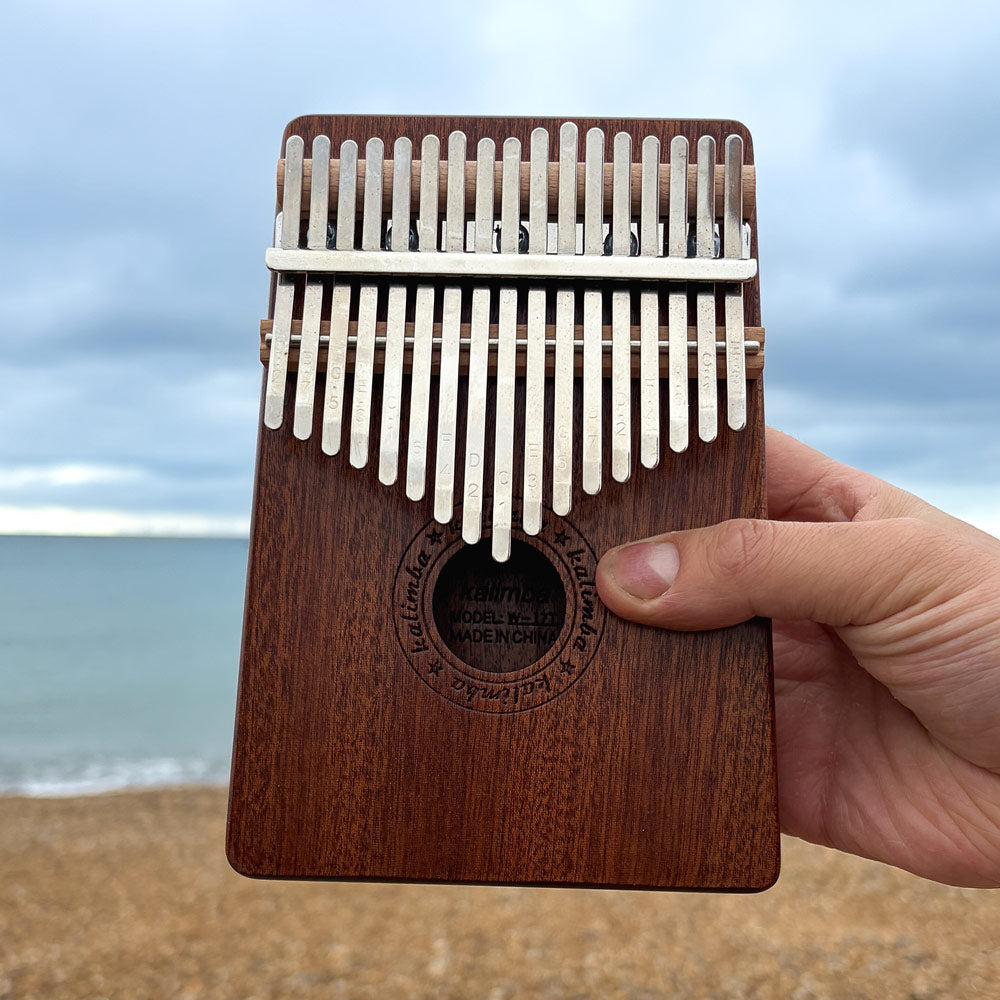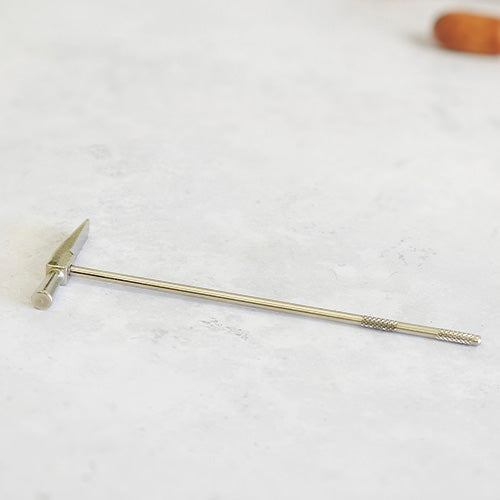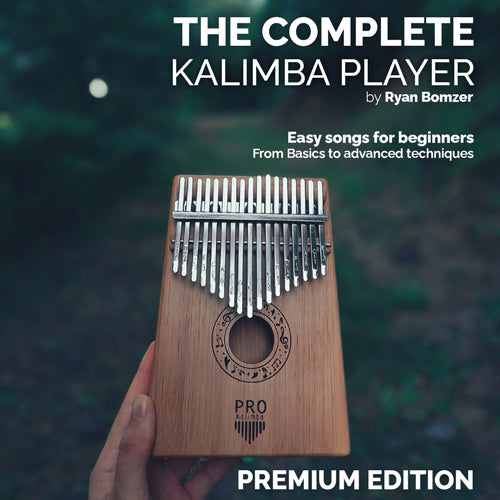Discover easy nursery rhymes that you can play on the kalimba. Our simple tabs will have you playing some songs in no time.
1. Ten little Indians
Ten Little Indians is a counting song that helps children learn numbers through repetition and rhythm. Its simple melodic pattern makes it ideal for beginner kalimba players who want an easy, structured tune to practise note accuracy.
C° C° C° C° C° C°
E° G° G° E° C°
Get the full Ten Little Indians kalimba tab.
2. Frère Jacques (kalimba tab)
Frère Jacques is a well-known French nursery rhyme dating back to the late 17th century, traditionally attributed to Rameau, with the earliest printed melody appearing in 1780. The English lyrics translate to “Are you sleeping, Brother John?” and the song has been adapted into countless versions worldwide, from Afrikaans and Japanese to Xhosa. Although never a chart hit, it was famously recorded by The Beatles and remains a staple in British primary schools. Its simple, repetitive melody makes Frère Jacques an ideal beginner kalimba song, easy to learn, suitable for all ages, and perfect for teaching children their first melody.
C D E C C D E C
E F G E F G
Get the full Frere Jacques kalimba tab.
3. Rain Rain Go Away (kalimba tab)
Rain Rain Go Away is a song that was written in 1533 and dates back to the reign of Queen Elizabeth I. Despite the time it was written, it wasn't commercially released until 1962 by Bobby Vinton. The song tells the story that is set at the carnival in which the weather is sunny at the beginning and towards the end the rain comes. Since its first release it has been released as a childrens nursery rhyme in 2014. The rain for some people is associated with negativity but hopefully this super easy kalimba tab will cheer you up!
G E G G E G G E A G G E
F F D D F F D G F E D E C C
Get the full Rain Rain Go Away kalimba tab.
4. Mary Had a Little Lamb (kalimba tab)
Mary Had a Little Lamb is a classic nursery rhyme attributed to composer Lowell Mason and inspired by a real-life incident involving Mary Elizabeth Sawyer, born in 1806, who famously brought her pet lamb to school. Commonly taught at an early age, the song is known for its calm, simple melody, making it one of the best introductions to music for children. When played on the kalimba, the gentle tones enhance its soothing quality, making it ideal for beginners, easy to repeat after the first two lines, and perfect for relaxing or bedtime sing-alongs.
Get the full Mary Had a Little Lamb kalimba tab.
5. Old MacDonald Had a Farm (kalimba tab)
Old MacDonald Had a Farm is a classic children’s nursery rhyme and animal song first published around 1917 in the United States. It is believed to have been inspired by the American tune “Ohio (Old Macdougal Had a Farm)” from Tommy’s Tune Collection, a World War I–era songbook. The melody may trace back even further to the 1908 English folk song “Workhouse Marylebone,” later documented by Cecil Sharp after being sung by Mrs. Goodey. Regardless of its exact origins, Old MacDonald Had a Farm remains a favourite for children and adults alike and is well suited to simple, repetitive kalimba playing.
Get the full Old Macdonald Had A farm kalimba tab.
6. Blow the Man Down
Blow the Man Down is a classic sea shanty where a sailor from Hong Kong, beckons young sailors to listen to his tales of life at sea. In exchange for a drink, he offers to share his experiences aboard ships like the Black Ball, showcasing the varied backgrounds of sailors and the rugged life they lead. The song highlights Jack Williams as the commanding figure and advises against challenging the authority of seasoned sailors.
(G’ G) G’ G’ A’ G’ E’ C’ E’
G’ A’ G’ E’ (G’ C’) A’
Get the full Blow the man down kalimba tab.
7. London Bridge is falling down
London Bridge Is Falling Down is one of the oldest English nursery rhymes, with a melody that repeats predictably throughout the song. This repetition makes it easy to memorise and perfect for early kalimba practice.
G A G F E F G
D E F E F G
Get the full London Bridge kalimba tab.
8. Five Little Ducks
Five Little Ducks is a popular children's song that tells the story of five ducklings who venture away from their mother. As they explore the world, each duckling gradually disappears or gets lost, leaving the mother duck searching for them. The song follows a repetitive structure, with each verse counting down the remaining ducklings until they are all reunited with their mother. It's a playful and educational tune aimed at teaching young children about numbers, subtraction, and the importance of staying close to family.
C° C° C° C° E° G° E° C°
D° D° D° D° C° B C° D°
Get the full Five Little Ducks kalimba tab.
9. The ABC Song
This popular childrens nursery rhyme teaches the alphabet in a fun and engaging way. The song helps young children learn the letters of the alphabet by singing them in sequence to a catchy melody. It serves as a foundational tool for early childhood education, aiding in language development and pre-literacy skills. The song's repetitive structure and lively tune make learning the alphabet enjoyable and memorable for young learners.
C C G G A A G
F F E E D D D D C
Get the full ABC Song kalimba tab.
10. Heads, shoulders, knees and toes
Heads, Shoulders, Knees and Toes is an action-based nursery rhyme that combines movement with music. On the kalimba, its short phrases make it easy for beginners to play while keeping a steady rhythm.
C° D° C° B C° A
C° C° C° C° D° C° B C° A
Get the full Heads, Shoulders Knees and Toes kalimba tab.
11. Row, row row your boat
Row, Row, Row Your Boat is traditionally sung as a round, making it fun to play alone or with others. Its smooth, flowing melody translates beautifully to the kalimba and is easy to pick up quickly.
C C C D E E D E F G
C° C° C° G G G
Get the full Row, Row, Row Your Boat kalimba tab.
12. Humpty Dumpty sat on a wall
Humpty Dumpty is a complete classic that is loved by children, the melody is instantly recognisable and sounds awesome on the kalimba.
Get the full Humpty Dumpty kalimba tab.
13. Hot Cross Buns
Hot Cross Buns is a traditional nursery rhyme and song that has been passed down through generations. It is believed to have originated in England in the 18th century, and it is typically associated with the Christian holiday of Good Friday. The song's catchy melody and simple lyrics have made it a favorite among children and adults alike. The lyrics of the song are about a vendor selling hot cross buns on the streets. The song's repetitive melody and playful tone make it fun to sing along to, and it continues to be a beloved children's song all over the world.
E D C E D C
C C C C D D D D E D C
Get the full Hot Cross Buns kalimba tab.
14. Bingo was his name-o
Bingo Was His Name-O is a repetitive spelling song that helps reinforce memory and rhythm. The steady melody makes it well suited to beginner kalimba players learning to keep time.
C F F C C D D C
C F F G G A F
Get the full Bingo Was His Name-O kalimba tab.
15. Rock a bye baby
Rock-a-Bye Baby is a gentle lullaby with a calm, soothing melody. Its slow pace makes it ideal for relaxed kalimba playing and bedtime practice.
C E A G F C C F E
F D B A G G F D C
Get the full Rockabye Baby kalimba tab.
16. Drunken Sailor
Drunken Sailor is a traditional sea shanty known for its strong, recognisable melody. When played on the kalimba, it offers a fun way for beginners to practise repeated note patterns.
Get the full Drunken Sailor kalimba tab.
17. If your happy and you know it
Get ready to clap your hands and be happy with this nursery rhyme. This is more than a catchy children’s song—it’s a globally recognized tool for learning and development, rooted in a traditional Spanish folk melody. Its simple, repetitive format helps kids express emotions, build coordination, and follow instructions, making it a favourite among educators and therapists. With endless variations and actions, it’s a playful way for children everywhere to explore feelings and have fun.
Get the full If Your Happy and You Know it kalimba tab.
18. Hickory dickory dock
Hickory Dickory Dock is a playful nursery rhyme built around a simple rising and falling melody. It’s excellent for helping beginners practise timing and note movement on the kalimba.
E F G F E D E E
E G F D E E
Get the full Hickory Dickory Dock kalimba tab.
19. Twinkle Twinkle Little Star
“Twinkle Twinkle Little Star” is a 200-year-old poem by Jane Taylor set to a French melody that also inspired the ABC song and “Baa Baa Black Sheep.” Loved by parents and teachers alike, it boosts memory, rhythm, and language skills, and even Mozart composed variations of it. Though we usually sing just one verse, the original has five, offering a deeper, poetic look at the night sky.
Get the full Twinkle Twinkle Little Star kalimba tab.
20. Jack and Jill went up the hill
G G G G C° C° C° C°
D° D° D° D° E° C°
Get the full Jack and Jill kalimba tab.
21. I can sing a rainbow
I Can Sing a Rainbow is designed to teach colour recognition through music. Its gentle melodic steps make it approachable for beginner kalimba players of all ages.
C D E D C E G G A
F D G E C D E F G C B° A
Get the full I Can Sing A Rainbow kalimba tab.
22. Ring-a-ring-a-roses
Ring-a-Ring-a-Roses is a traditional rhyme often sung during circle games. The repeating melody makes it easy to learn and enjoyable to play on the kalimba.
G B B A C B G
G B B A C B G
Get the full Ring A Ring A Roses kalimba tab.
23. Pop goes the weasel
Pop Goes the Weasel is a lively folk tune with a playful surprise ending. Its repeating structure helps beginners build confidence while playing familiar melodies.
G C° C° D° D° E° G° E° C°
G C° C° D° F° E° C°
Get the full Pop Goes the Weasel kalimba tab.
24. You are my sunshine
You Are My Sunshine is a well-loved song known for its warm, comforting melody. On the kalimba, it sounds expressive while remaining simple enough for beginners.
G C D E E E DE C C
C D E F A A G F E
Get the full You Are My Sunshine kalimba tab.
25. Happy Birthday to You
Learn how to play the most famous nursery rhyme of all, happy birthday is a must learn song when it comes to playing the kalimba. It is one of the best songs to learn becuase it allows you to play and sing the lyrics at the same time which can supercharge your timing which is an essential part of learning to play the kalimba.
Get the full Happy Birthday to You kalimba tab.
26. This old man
This Old Man is a counting rhyme that builds through repetition and rhythm. The predictable melody makes it ideal for early kalimba learners practising consistency.
G E G G E G
A G F E D E F
Get the full This Old Man kalimba tab.
27. Three blind mice
Dating back to 1609, “Three Blind Mice” is one of the oldest nursery rhymes, possibly referencing Queen Mary I’s persecution of Protestant bishops. Its catchy repetition helps kids build speech and memory skills, and its simple tune is ideal for beginner musicians. Despite its dark backstory, it remains a global childhood classic.
Get the full Three Blind Mice kalimba tab.
28. The Finger Family Song
The Finger Family Song is commonly used to teach family roles and coordination through music. Its repetitive melodic phrases make it easy and engaging for beginner kalimba players.
C E G G , C E G G , A C° G
C° G G, C° G G
Get the full finger family song kalimba tab.
29. I’m A Little Teapot
Written in 1939 to help kids learn dance moves, “I’m a Little Teapot” combines simple lyrics with playful actions that build coordination, rhythm, and confidence. Though it started in the U.S., it became a worldwide preschool favourite, evolving with fun new verses and variations over time.
Get the full Im A Little Teapot kalimba tab.
30. Soft Kitty (kalimba tab)
Soft Kitty is a children’s song popularised by Sheldon and Penny in The Big Bang Theory, most notably in Season 1, Episode 11 (The Pancake Batter Anomaly), where Penny sings it to Sheldon when he is ill. Originally titled “Warm Kitty,” the song was written by Edith Newlin and first published in 1937 in Songs for the Nursery School, which sold over 10,000 copies. The song later became the subject of a copyright lawsuit filed by Newlin’s heirs in 2015. Today, Soft Kitty is widely recognised and is considered one of the easiest songs to play on the kalimba, making it ideal for beginners.
D B B C A A G A B C D
The Only Kalimba Songbook You'll Ever Need
The fastest way to build confidence and technique is by playing real music. The Kalimba Songbook is a focused collection of 80 expertly arranged tabs, designed specifically for beginners and developing musicians who want to bypass the long theory sections and get straight into making music. This songbook removes frustration by giving you clean, easy-to-read tablature that guides you. This resource is your direct path to unlocking a wide range of popular tunes.






1 comment
Janet Hales
Thank you for the helpful kalimba tabs.